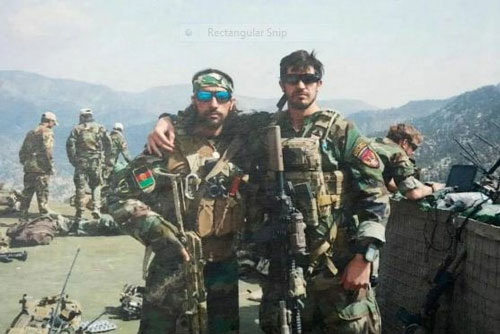Wadded up in a crumpled piece of notebook paper among Akhtar Silab’s limited possessions is an assortment of cellphone SIM cards that made their way with him from Afghanistan to Boise and contain the many memories from a now-past life half a world away.
The miniature memory chips together hold a decade’s worth of photographs and videos from the 20-year American conflict in Silab’s home nation, which came to an abrupt end last month.
They include his numerous wartime triumphs slinking in and out of rudimentary tunnels to detonate roadside bombs intended for United States military vehicles.
And, as if locked in time, they also contain pictures of him with fellow troops and American commanders working to rid Silab’s country of Islamic extremists, including the Taliban.
This month, from the once-unthinkable calm and safety of a Boise hotel, Silab reflected upon the renewed dangers in Afghanistan for his family and countrymen, who find themselves once more under Taliban rule.
“Everything there now is really bad,” Silab said after finishing a cigarette, donning the same thick beard and shoulder-length black hair from his days in battle.
“With the Taliban, everything stops. … Everything is blocked. This (is) not good for my people, my Afghanistan people. Many, many will be killed.”
Silab, 30, along with his wife and their toddler, were some of the fortunate ones among the estimated 100,000 at-risk Afghans who got out ahead of the Aug. 30 U.S. pullout.
Since that time, the Taliban have taken control of the Kabul airport and prevented several international flights from departing. U.S. Secretary of State Antony Blinken also said regime leadership has claimed that many Afghans who already had approval to head to America lacked proper documentation to leave the country.
Despite the Taliban’s efforts to hunt down and halt exit to former members of the Afghan armed forces, as well as interpreters, translators and others who helped the U.S. military, the Silabs escaped.
As a decorated member of the Afghan Army special forces who led a unit trained in removing landmines from critical routes, Silab was prioritized to depart Afghanistan through a special American visa program.
Idaho this year has welcomed 37 Afghans who fled their nation, according to the Idaho Office for Refugees, to either Boise or Twin Falls.
With tens of thousands more seeking asylum, the Biden administration included the two cities among a list of almost 140 locations across the U.S. designated for Afghan refugee resettlement, according to Gov. Brad Little’s office.
More than half of those Afghan refugees who arrived to Idaho have come since the end of July, just ahead of the American-backed government’s collapse.
Nine of those individuals came through the special immigration visa program that also offered Silab and his family entry into the country.
Even so, Silab’s journey was hardly straightforward, or free from suffering. In June, Silab, his wife, his child and his brother’s family were traveling between Kabul and his home about three hours south in the Paktia Province for interviews at the U.S. Embassy.
They made the scheduled trip to finalize their visas. Upon their return, Silab said the Taliban ambushed their vehicle; his wife, Brishna, was struck by a bullet on her left side, leading to more than two weeks of treatment in a Kabul hospital.
His brother’s wife was also shot in the neck, Silab said, and a bullet passed through the back of Silab’s 11-month-old nephew.
Both survived, though he said shrapnel in his sister-in-law’s throat has required additional medical care in California, where his brother’s family arrived a few weeks before Silab made it to the U.S. in mid-August.—Agencies










